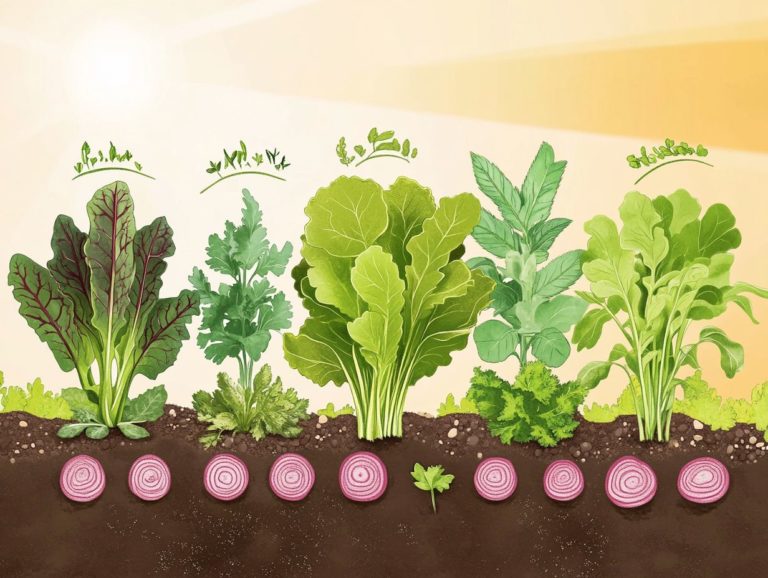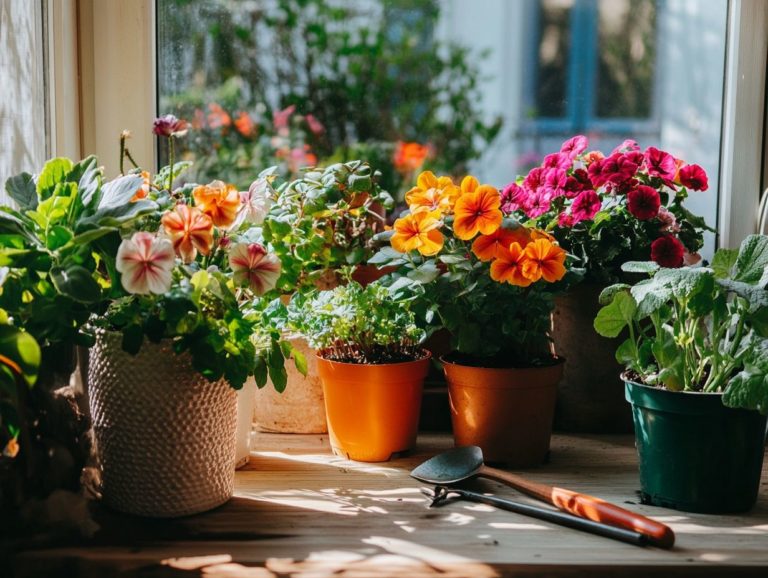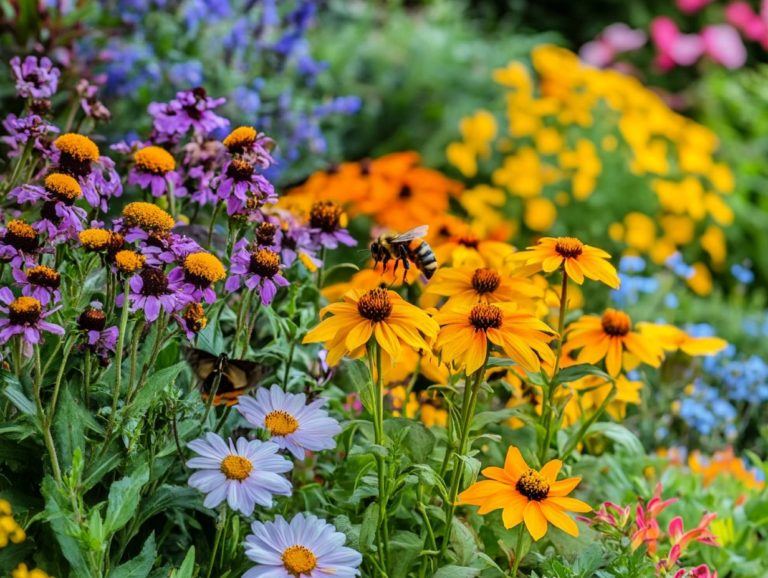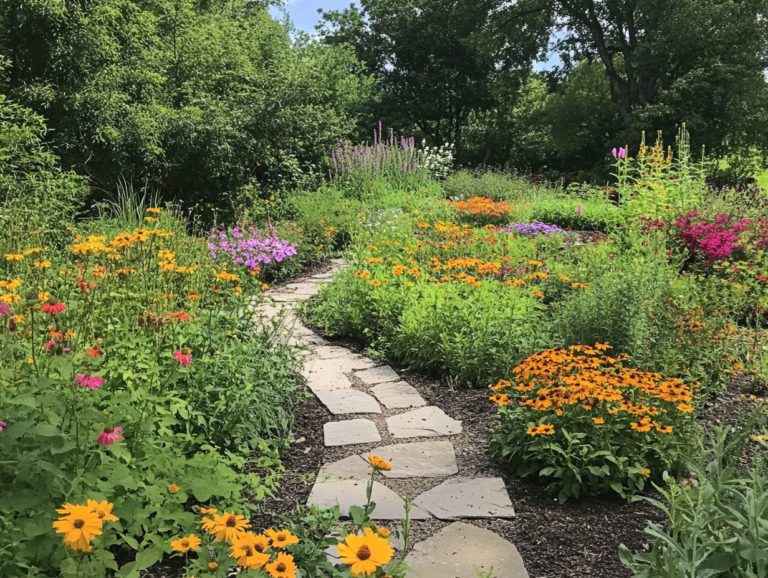“Herbs to Enhance Your Permaculture Garden”
Transforming your permaculture garden into a thriving ecosystem is more attainable than you might imagine, especially with the incorporation of herbs.
These versatile plants do much more than elevate flavors and aromas in your culinary creations. They also act as invaluable allies in fostering a balanced garden.
From companion planting and natural pest control to enhancing soil health and attracting pollinators, the advantages of herbs are vast and impressive.
Get ready to learn how to grow and use herbs effectively! This guide will equip you with everything you need to know about selecting, growing, and utilizing herbs to cultivate a flourishing permaculture space.
Immerse yourself in this journey to discover how herbs can elevate your gardening experience and contribute to a more sustainable lifestyle!
Contents
- Key Takeaways:
- 1. Choosing the Right Herbs for Your Permaculture Garden
- 2. Companion Planting with Herbs
- 3. Using Herbs for Natural Pest Control
- 4. Herbs for Improving Soil Health
- 5. Medicinal Herbs for Your Permaculture Garden
- 6. Culinary Herbs to Add Flavor to Your Garden
- 7. Herbs for Attracting Pollinators
- 8. Using Herbs as Ground Cover
- 9. Herbs for Adding Color and Aesthetics to Your Garden
- 10. Herbs for Controlling Weeds
- 11. How to Properly Harvest and Store Herbs
- 12. Common Mistakes When Growing Herbs in a Permaculture Garden
- 13. How to Incorporate Herbs into Your Permaculture Design
- 14. Tips for Maintaining a Healthy Herb Garden
- 15. The Benefits of Growing Herbs in Your Permaculture Garden
- What Are the Best Herbs for Beginners to Grow?
- Frequently Asked Questions
- What are the benefits of using herbs in a sustainable garden?
- Which herbs are best for attracting beneficial insects?
- How do herbs improve soil health?
- What are some popular medicinal herbs that can be grown in a sustainable garden?
- How can herbs be used in companion planting to enhance a sustainable garden?
- What are the best ways to utilize fresh herbs from a sustainable garden?
Key Takeaways:
Here are some quick tips to boost your permaculture garden with herbs!
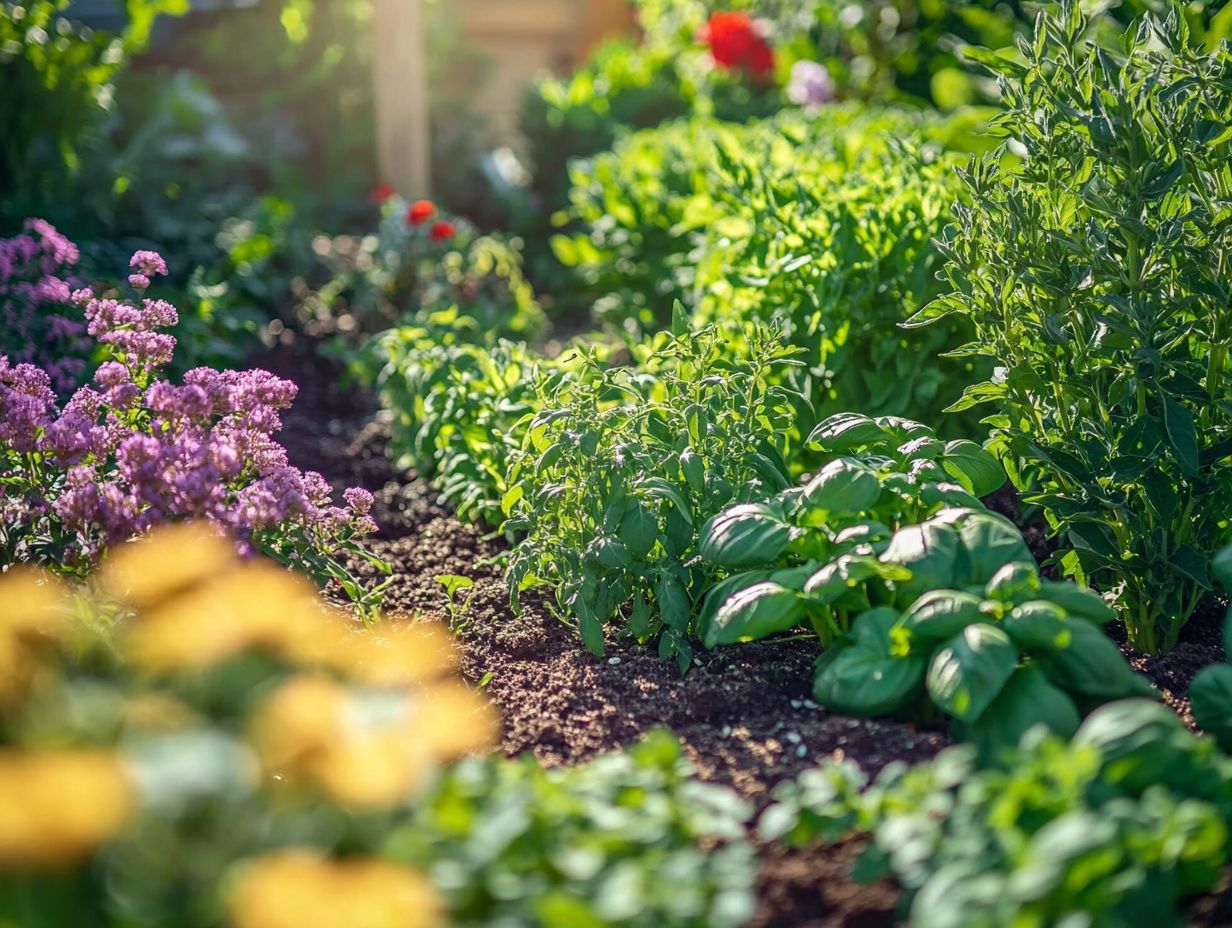
- Enhance your permaculture garden with a variety of herbs, from medicinal to culinary to attract pollinators.
- Use herbs for natural pest control, improving soil health, and as ground covers to maintain a healthy garden.
- Incorporate herbs into your permaculture design and avoid common mistakes while harvesting, storing, and growing them.
1. Choosing the Right Herbs for Your Permaculture Garden
Selecting the right herbs for your permaculture garden is crucial for growing a thriving garden that enhances biodiversity and boosts soil fertility. These herbs also attract beneficial insects while serving a variety of culinary and medicinal purposes.
Consider herbs like dandelion, yarrow, and chamomile. They not only tantalize your taste buds but also enrich the ecosystem by improving soil health and fostering a self-sustaining environment.
To truly maximize these benefits, evaluate herbs based on their growth habits, nutrient needs, and resilience to pests. For example, lemon balm adds a refreshing twist to your teas while drawing in pollinators. Clover naturally fixes nitrogen in the soil, and comfrey creates nutrient-rich mulch to nourish your garden.
By emphasizing biodiversity, these herbs cultivate a balanced ecosystem that promotes a sustainable lifestyle, with each plant contributing to environmental harmony. Integrating such a diverse array of herbs into your permaculture approach allows you to cultivate not just plants but a vibrant biome that supports life and health.
2. Companion Planting with Herbs
Companion planting with herbs is a strategic approach in permaculture that enhances the health of your garden. By working together, you can promote pest control and attract beneficial insects, all while creating a balanced ecosystem.
When you incorporate specific herbs alongside a variety of vegetables, you can significantly boost both plant growth and resistance to pests. For example, planting chamomile near your tomatoes not only accelerates their growth but also draws in beneficial pollinators like bees, which are crucial for fruit set.
Similarly, interspersing basil with your peppers can deter pesky aphids while allowing both plants to flourish together. Companion planting supports a healthier garden environment and aligns with sustainable gardening principles.
By understanding and leveraging these interactions, you can cultivate a more resilient ecosystem that minimizes the need for chemical interventions.
3. Using Herbs for Natural Pest Control
Using herbs for natural pest control is crucial for sustainable gardening. This approach attracts beneficial insects that manage pest populations, promoting the overall health of your ecosystem and reducing the need for chemical interventions.
Consider fennel and chives. Both enhance the flavors of your dishes and play a vital role in organic gardening. Fennel’s feathery foliage invites ladybugs and lacewings, natural predators of aphids. Meanwhile, chives release a strong scent that repels pests like carrot flies and aphids, while attracting pollinators.
By incorporating these herbs into your garden, you create a diverse environment that boosts plant resilience. This method creates a lively balance in your garden, allowing it to thrive naturally without harsh chemicals.
4. Herbs for Improving Soil Health
Adding specific herbs to your permaculture garden can significantly improve soil health by increasing fertility and adding organic matter.
Take clover, for example. This amazing herb elevates nitrogen levels and prevents erosion. Plant clover as a cover crop to keep your soil well-aerated and structured, which improves water retention.
Composting clover and similar nutrient-rich herbs turns them into rich organic matter. This compost provides a sustainable nutrient source, nurturing a vibrant ecosystem that supports diverse plants and boosts your garden’s overall productivity.
5. Medicinal Herbs for Your Permaculture Garden
Integrating medicinal herbs into your permaculture garden enriches your edible landscape and provides valuable healing properties and traditional remedies.
Incorporate herbs like yarrow, known for stopping wounds and reducing inflammation, and comfrey, famous for its bone-healing abilities. These plants create a sanctuary that blends well-being with sustainability. This approach encourages biodiversity, boosts soil health, and invites beneficial insects, fostering an ecosystem built on mutual support.
These herbs serve practical purposes in first aid and herbal medicine, while also offering ecological benefits that extend beyond your garden beds.
6. Culinary Herbs to Add Flavor to Your Garden
Culinary herbs infuse your garden with flavor, providing delicious ingredients and supporting sustainable gardening practices that enhance soil vitality and ecosystem health.
Among the most beloved herbs, basil, parsley, and lemon balm shine in versatility and benefits. Basil elevates salads and pesto with its aromatic leaves. Parsley adds a refreshing touch to dishes and serves as a nutritional powerhouse. Lemon balm delights in teas and desserts, bringing a citrusy zest.
In permaculture, these herbs enhance garden biodiversity by attracting pollinators and beneficial insects. This not only nurtures a thriving ecosystem but also creates a vibrant outdoor experience for gardening enthusiasts. Start planting these herbs today and watch your garden come alive!
7. Herbs for Attracting Pollinators
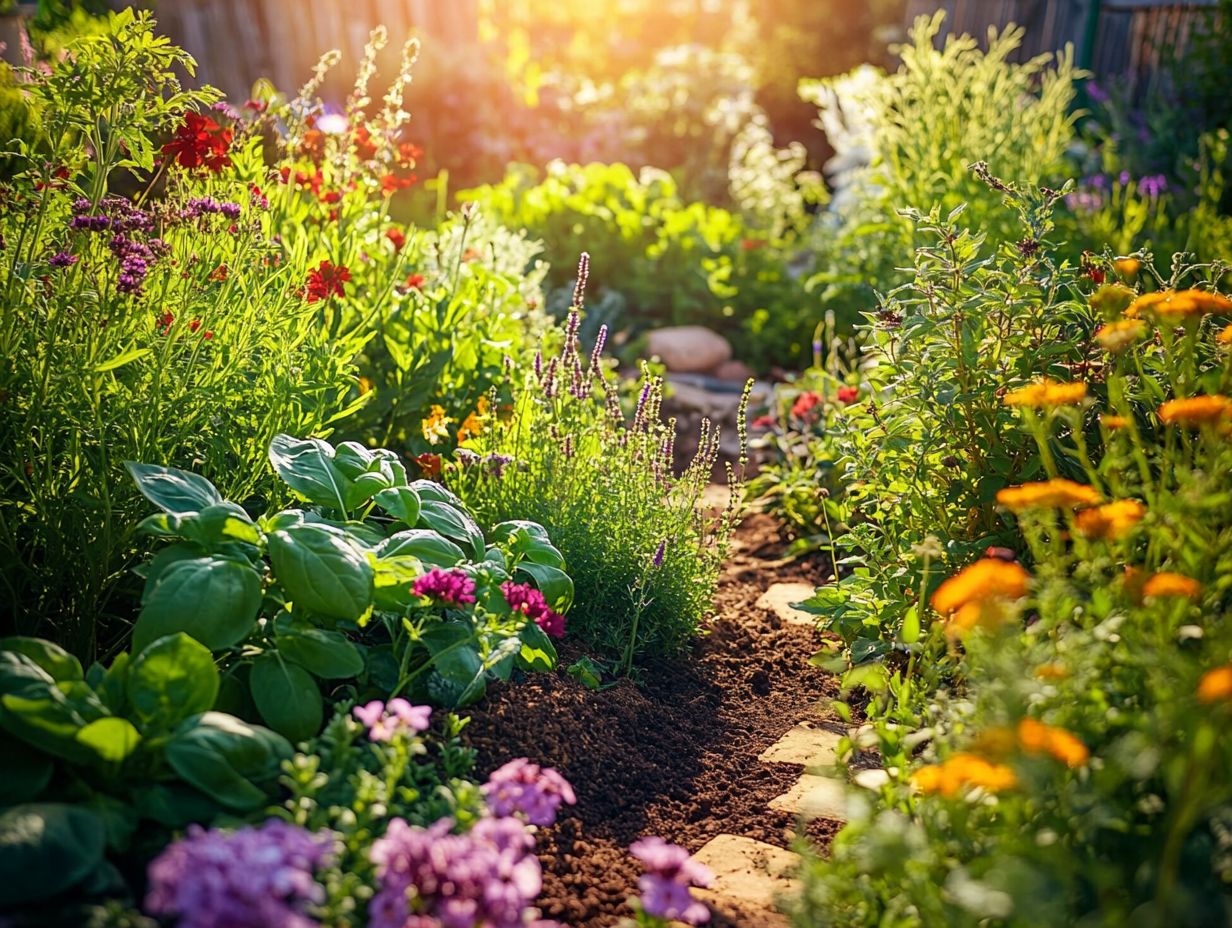
Planting herbs that attract pollinators is an essential strategy for improving plant variety and supporting the health of your ecosystem in a permaculture garden. This method helps your plants flourish like never before!
Among the most advantageous herbs you can choose are chamomile and fennel. These herbs act as magnets for pollinators like bees and butterflies. Chamomile, with its delicate flowers, not only adds a soothing aroma to your garden but also provides vital nectar during critical blooming periods.
On the other hand, fennel s tall, feathery stalks and tiny blooms create an inviting habitat for a variety of beneficial insects. By incorporating these herbs, you can act now to maintain a vibrant ecosystem, encouraging the pollination of nearby plants and enhancing their overall productivity.
Integrating such herbs into your sustainable gardening practices fosters a resilient landscape that nourishes both you and the wildlife that enriches your garden.
8. Using Herbs as Ground Cover
Herbs as ground cover are a smart choice in permaculture. This strategy significantly enhances soil quality, conserves moisture, and supports biodiversity, creating a vibrant, self-sustaining ecosystem in your garden.
By incorporating resilient plants like clover and lemon balm, you can effectively combat soil erosion. These hardy herbs develop extensive root systems that stabilize the earth.
These ground cover herbs also protect the soil from harsh rain and wind impacts. Additionally, they contribute to soil health by adding organic matter as they grow and decompose.
Their growth patterns foster habitats for beneficial insects, nurturing a robust ecosystem. This approach cultivates a healthier garden and embraces sustainability in your gardening practices, reducing reliance on synthetic fertilizers and promoting natural growth cycles.
9. Herbs for Adding Color and Aesthetics to Your Garden
Incorporating herbs into your permaculture garden offers more than just practicality; it infuses vibrant colors and aesthetic allure. This creates an edible landscape that captivates the eye while remaining functional.
Consider herbs like purple basil, with its rich hues, and flowering chives, adorned with delicate blooms. These stunning varieties can elevate a mundane garden into a visual spectacle.
Not only do they enchant the senses, but they also attract beneficial pollinators, enriching the ecosystem you re nurturing. Striking the perfect balance between aesthetic appeal and practicality is essential.
Every herb should be selected for its beauty and its role in enhancing the overall health and productivity of your permaculture design. By thoughtfully curating your herb selection, you can cultivate a space that is both striking and abundant.
10. Herbs for Controlling Weeds
Utilizing herbs to control weeds in your permaculture garden is not just effective; it s an eco-friendly strategy. This allows these plants to outcompete unwanted species while enriching the soil and supporting biodiversity.
Among these herbs, comfrey and yarrow truly shine with their remarkable properties. Comfrey, with its deep taproots, draws up essential nutrients from the soil and creates a lush ground cover that suppresses weed growth.
This helps you maintain moisture in your garden. Yarrow, on the other hand, attracts beneficial insects and enhances soil structure, fostering a healthier garden ecosystem.
By incorporating these herbs into your garden, you cultivate an environment that thrives on natural processes, perfectly embodying the principles of sustainable gardening that prioritize ecological balance and resilience.
11. How to Properly Harvest and Store Herbs
Properly harvesting and storing herbs is essential for maximizing their culinary and medicinal benefits. This ensures you can savor the flavors and healing qualities of your permaculture garden all year round.
Timely harvesting is key. Collecting herbs at their best flavor enhances both aroma and taste. The morning, after the dew has dried, is the ideal time to gather your herbs, as that s when their essential oils are most concentrated.
Using sharp, clean cutting tools is a must to avoid damaging the plants. This helps promote future growth. After harvest, you can choose from methods like air drying, water drying, or using a dehydrator to preserve your herbs. Proper storage in airtight containers protects them from light and moisture.
Make it a priority to check your stored herbs regularly for any signs of degradation. This simple practice ensures that their potent flavors and health benefits remain intact for as long as possible.
12. Common Mistakes When Growing Herbs in a Permaculture Garden
Many gardeners stumble into common mistakes when growing herbs in a permaculture garden. These missteps can hinder plant growth and disrupt the delicate balance of sustainable gardening.
One prevalent error is overwatering, which can lead to root rot, a disease caused by too much moisture. It s essential to check soil moisture before reaching for that watering can. Poor soil preparation can also impact nutrient availability for your herbs. By incorporating organic matter and ensuring proper drainage, you create a healthy environment for growth.
Another common oversight is neglecting companion planting. Certain herbs thrive better alongside others, enhancing their growth and pest resistance. By understanding these pitfalls and implementing strategies like proper watering techniques and amending your soil, you can cultivate a flourishing herb garden that truly supports your permaculture goals.
13. How to Incorporate Herbs into Your Permaculture Design
Incorporating herbs into your permaculture design is a crucial strategy for enhancing ecosystem health and biodiversity. They offer a wealth of benefits, from culinary and medicinal uses to attracting beneficial insects and improving soil quality.
To effectively weave these plants into different zones of your garden, engage in careful planning. Employ companion planting techniques, pairing specific herbs with vegetables to fend off pests and stimulate growth. Implementing crop rotation helps maintain soil fertility while preventing disease buildup.
Creating herbaceous plant guilds groups of plants that support one another maximizes your yields and fosters a vibrant environment. By thoughtfully arranging herbs like thyme, basil, and marigold alongside your primary crops, you cultivate a harmonious ecosystem that benefits each plant and elevates the sustainability of your garden.
14. Tips for Maintaining a Healthy Herb Garden
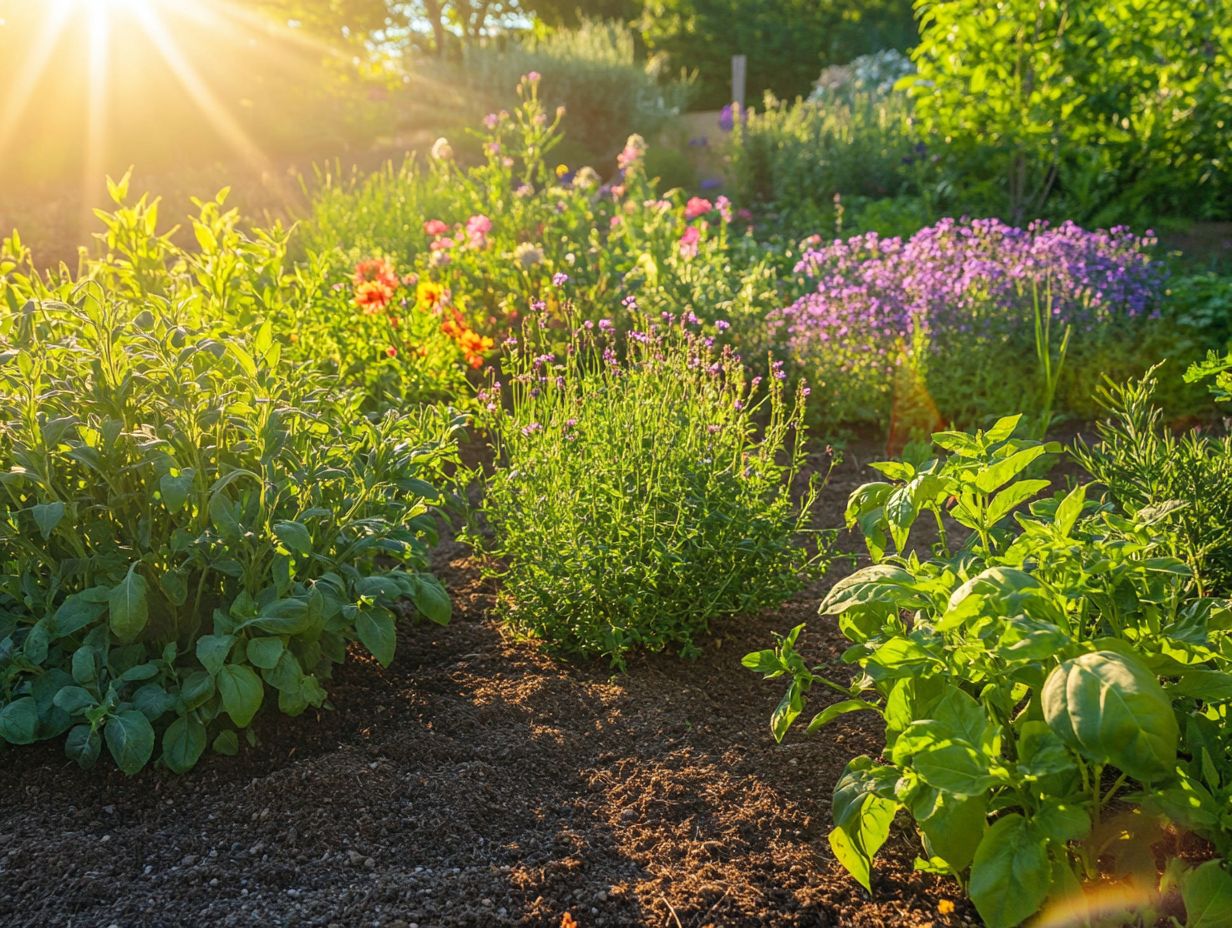
Keep your herb garden thriving by staying focused and proactive! This demands keen attention to various factors, including soil fertility, effective watering practices, and regular pruning. This dedication ensures that your sustainable gardening efforts yield vibrant, productive plants.
To promote optimal growth, enrich your soil with organic matter like compost. This elevates nutrient levels and enhances drainage. Implement mindful watering techniques, such as deep soaking less frequently, to encourage robust root systems while warding off pesky fungal issues.
To keep your herbs healthy, staying vigilant against pests is essential. Consider natural remedies like neem oil or companion planting to keep unwanted insects at bay. Seasonal care, such as mulching during the summer and taking protective measures in colder months, strengthens your plants against environmental stressors and cultivates a flourishing habitat.
By adopting organic gardening practices, you contribute to the health of your soil and enhance the flavor and nutritional value of your herbs. Start planting and nurturing your herbs today, and enjoy the benefits they bring to your kitchen and garden!
15. The Benefits of Growing Herbs in Your Permaculture Garden
Growing herbs in your permaculture garden offers many benefits. They enhance your cooking experiences and provide medicinal properties. Additionally, they improve the overall health of your ecosystem and support a sustainable lifestyle.
These herbs can be a game changer for pest control. They naturally repel unwanted insects while creating inviting habitats for beneficial ones. This harmonious relationship nurtures a thriving ecosystem, crucial for maintaining balance in your garden.
Many herbs work wonders for soil improvement. They enhance nutrient content and structure, which fosters better water retention and boosts microbial activity.
Moreover, herbs attract pollinators like bees and butterflies essential players in boosting your garden’s productivity. These characteristics align perfectly with permaculture principles, encouraging a self-sustaining environment that minimizes waste and promotes biodiversity.
What Are the Best Herbs for Beginners to Grow?
As you start your herb gardening journey, choosing easy-to-grow herbs can build confidence and provide quick rewards in culinary and medicinal applications.
Herbs like chives, lemon balm, and chamomile offer a seamless entry into gardening. Chives thrive in well-draining soil and require minimal watering once established, making them ideal for novices. Lemon balm enjoys full sun and is fantastic for tea. Chamomile blooms beautifully and provides calming properties, adding both charm and functionality to your garden.
Each of these herbs has unique care requirements, allowing you to learn essential skills without feeling overwhelmed. As you cultivate your garden, you ll enjoy immediate culinary benefits and nurture a passion for gardening that will flourish alongside your green thumb.
How Can Herbs Be Used in Cooking and Everyday Life?
Herbs effortlessly enhance your cooking and daily life. They enrich flavors, provide nutritional benefits, and offer unique culinary experiences that celebrate your permaculture garden’s bounty.
Imagine vibrant basil elevating your classic pesto or the earthy notes of rosemary enhancing your roasted meats. These versatile plants add depth and personality to every dish you create. Fresh herbs can brighten a simple salad or elevate a homemade soup, while dried herbs deliver concentrated flavors in spice blends and marinades.
Their magic doesn t stop there. Herbs play a crucial role in crafting soothing teas. Consider options like chamomile to help you unwind or peppermint to aid digestion. By incorporating herbs into your daily meals, you enrich your taste and support a wholesome lifestyle, embracing a nutritious diet fueled by natural ingredients.
What Are the Environmental Benefits of Growing Herbs in a Permaculture Garden?
Growing herbs in your permaculture garden offers amazing environmental benefits that you ll love! They boost biodiversity, enhance soil fertility, and attract beneficial insects that help maintain a thriving ecosystem.
Some herbs are essential for nitrogen-fixing. This process helps soil absorb nitrogen, which plants need to grow. By incorporating varieties such as clover or vetch, you significantly improve soil fertility, creating a hospitable environment for other plants to thrive.
Many herbs also serve as delightful food sources for pollinators, drawing in bees and butterflies that are crucial for crop production. This symbiotic relationship supports these important species and contributes to a healthier garden environment.
Some herbs, like comfrey and nettle, can double as natural fertilizers, offering additional advantages for soil improvement and overall ecosystem health.
How Can Herbs Be Used for Natural Remedies and Self-Sufficiency?
Herbs can be your powerful allies in the quest for self-sufficiency and wellness. They allow you to harness the healing properties of your sustainable garden for everyday health needs.
By cultivating specific medicinal plants like chamomile, renowned for its calming effects, or peppermint, which aids digestion, you can craft your own herbal infusions for soothing teas. Picture yourself crafting soothing salves from calendula or lavender to provide relief for minor skin irritations. You can also create liquid extracts from echinacea to bolster your immune system with healing herbs.
Transforming these herbs into practical remedies not only gives you power but also deepens your connection to nature. This encourages a sustainable lifestyle that embraces health while minimizing your dependence on commercial products.
What Are Some Lesser-Known Herbs That Can Be Grown in a Sustainable Garden?
Exploring lesser-known herbs in your garden not only spices things up but also enhances biodiversity, offering unique flavors and medicinal qualities that can truly elevate your gardening experience.
Take lovage, for example. With its tall stalks and delightful celery-like flavor, it thrives in moist, rich soil. Lovage helps retain moisture for your surrounding plants, contributing to the overall ecosystem design. This herb serves as both a culinary gem and a magnet for beneficial insects, naturally keeping pests at bay.
Then there’s sorrel, known for its tart, lemony taste. It prefers well-drained soil and can thrive even in partial shade, bringing a vibrant splash of green to your garden.
By cultivating a diverse array of species, including dandelion and yarrow, you enrich your kitchen with a spectrum of flavors while significantly boosting the health of your ecosystem. This approach enhances soil fertility and supports a variety of pollinators.
Such diversity fosters a robust and resilient gardening environment, ultimately leading to a flourishing garden that thrives on its own, thanks to companion planting techniques.
Frequently Asked Questions
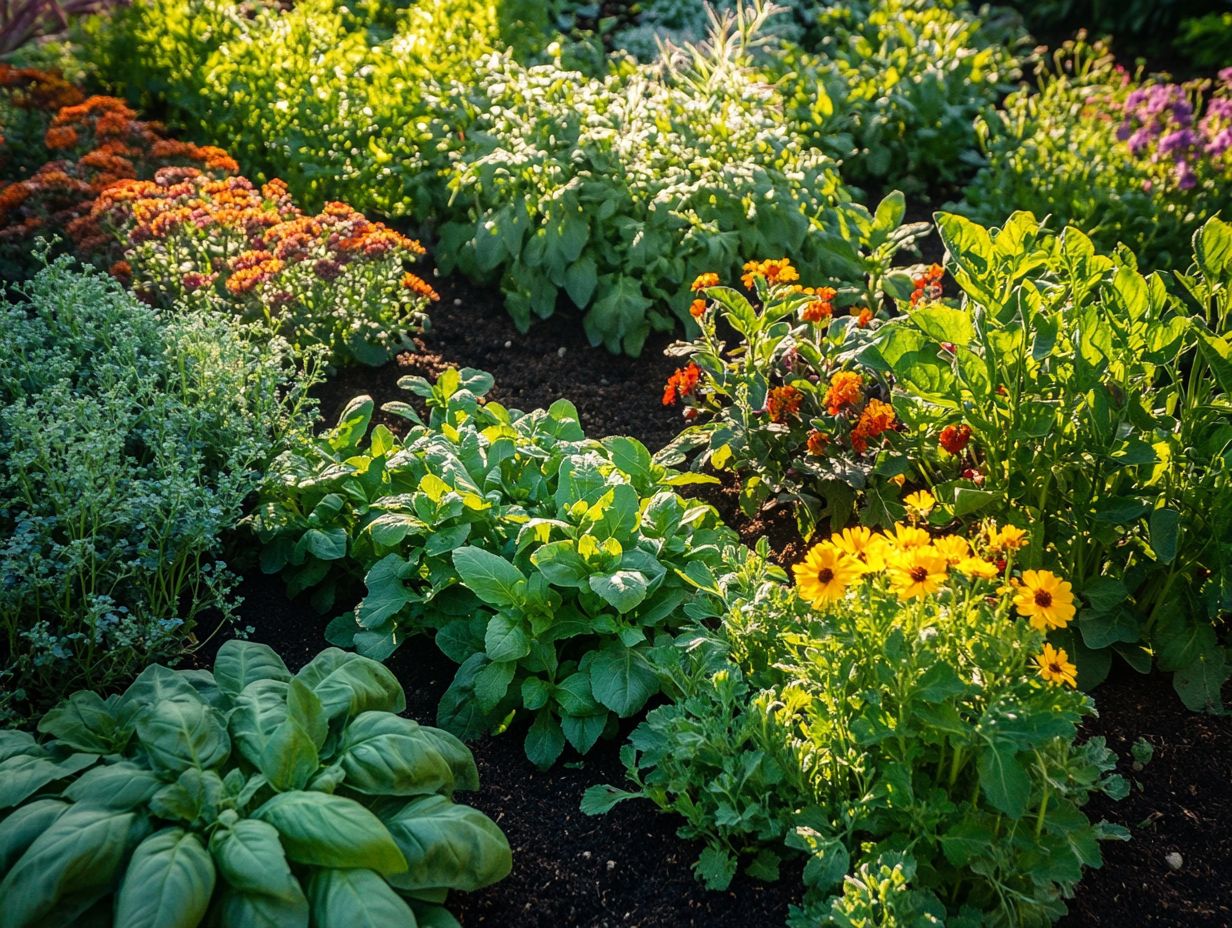
What are the benefits of using herbs in a sustainable garden?
Herbs not only add flavor to dishes but also attract beneficial insects, add nutrients to the soil, and have medicinal qualities.
Which herbs are best for attracting beneficial insects?
Some herbs known to attract beneficial insects include dill, fennel, parsley, and comfrey.
How do herbs improve soil health?
Herbs have deep root systems that help to aerate and break up compacted soil, contributing to soil improvement. They also add nutrients and organic matter to the soil.
What are some popular medicinal herbs that can be grown in a sustainable garden?
Some popular medicinal herbs include echinacea, lavender, peppermint, chamomile, lemon balm, and chives.
How can herbs be used in companion planting to enhance a sustainable garden?
Herbs can be planted alongside other vegetables and fruits to repel pests, attract beneficial insects, and enhance the flavor of neighboring plants through effective pest control strategies.
What are the best ways to utilize fresh herbs from a sustainable garden?
Fresh herbs can be used in cooking, made into teas and infusions, and used in homemade natural cleaners and beauty products, providing a foundation for organic gardening practices.
Start your herbal journey today and discover the benefits of sustainable gardening!

